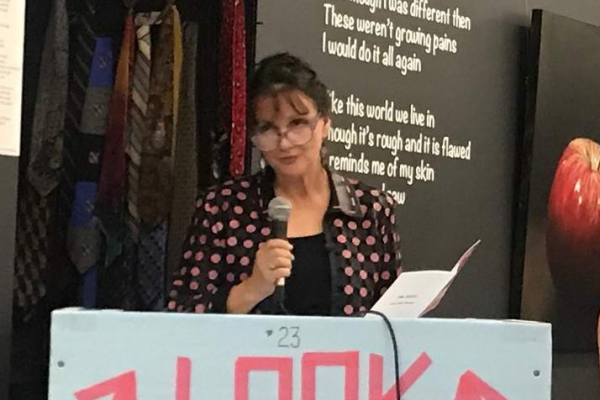
Welcome To The Poem Gallery
AFTER AUDEN’S MUSEÉ DES BEAUX ARTS
Auden’s right about disaster, the way it often finds us
in the ordinary. I could duplicate the angle of the broom,
the pattern of renegade dirt evading the pan, the smell
of Pop Tarts burning in a toaster. Everyone you loved
was busy living — checking e-mail, cleaning gutters,
slicing red tomatoes on a plate. Our days stack one by one
upon such rituals, familiar acts that shim our fragile world
to something, if not balanced, almost holy.
So how were we to know your last breath, sent out
like a good dog to fetch, wouldn’t come back?
Grief is too easily misperceived. Even now the void
you left could suck the churning sphere right down
with it, at least jam phone-lines and traffic, unleash
a small monsoon, meteor. Perhaps it has. Catastrophes catapult
daily; who names the cause of chaos in the world?
Your mother folds and folds the white sheets
but see how her corners don’t line up, and your father,
out raking leaves, notice his grip on the rake, how tightly he tries
to hold on, while the leaves, the leaves keep falling.
And over there, look, your black dog, crazed for a buried bone.
EPILOGUES FOR A BROTHER
FOR MARK PRUITT, 1960-1985
1. Rewriting the Last Flight
You do it like the hero in the movie: eject
just before the plumed crash, your white chute
floating like milkweed toward some grassy
field. And there, a girl, her black dog,
maybe tossing pebbles in a stream
or gathering fistfuls of daisies,
drops her wicker basket on the ground, and races
for the sun’s pearled glare.
She finds you in a puddle of silk, dazed, bruised
barely but enough to need her soft shoulder
as you hobble to her house for soup
and the buoyant rest of your life.
2. Minghun Bride: Afterlife Marriage
Assume the rest of your life doesn’t happen.
Take this burnt offering of cash,
and to cruise the netherworld, a paper model
of a Cessna SE. Like those along
the Yellow River Canyon seeking dead wives
for dead sons to bury them side by side,
I, too, would offer gold, 10,000 yuan: a dowry
for the dead, if you, brother, wanted a bride.
Who’s to say desire won’t outlive us?
In the Loess Plateau the poorest parents weave
the wives from straw, trusting the chemistry
of dirt. There’s wisdom in a match like that.
JANE DEALS WITH INFIDELITY
FOR JM
She cuts his ties in half,
hangs them over chairs, towel rods,
the door knobs he cocked silently
while she lay watching in the dark
wide awake.
She cuts them to a raw, sharp edge,
they fall from her fists
like tongues, smooth as silk
though she knows they are not.
Like whispers they are beautiful
and false. In each design she finds
a hidden pattern: a checked past
delicately woven that shimmered undetected
for years. A flaw that ran the full length
of him. And so she cuts them up
mid-phrase, drapes them from the couch,
kitchen drawers, window sills that trap
the evening breeze. At times she sees
them move, hears them mouth the same
cool lies:
imperfections, they claim, are not flaws;
they add to the beauty of the fabric,
and mixture of texture
is desired. Durability,
they swear, is not affected.